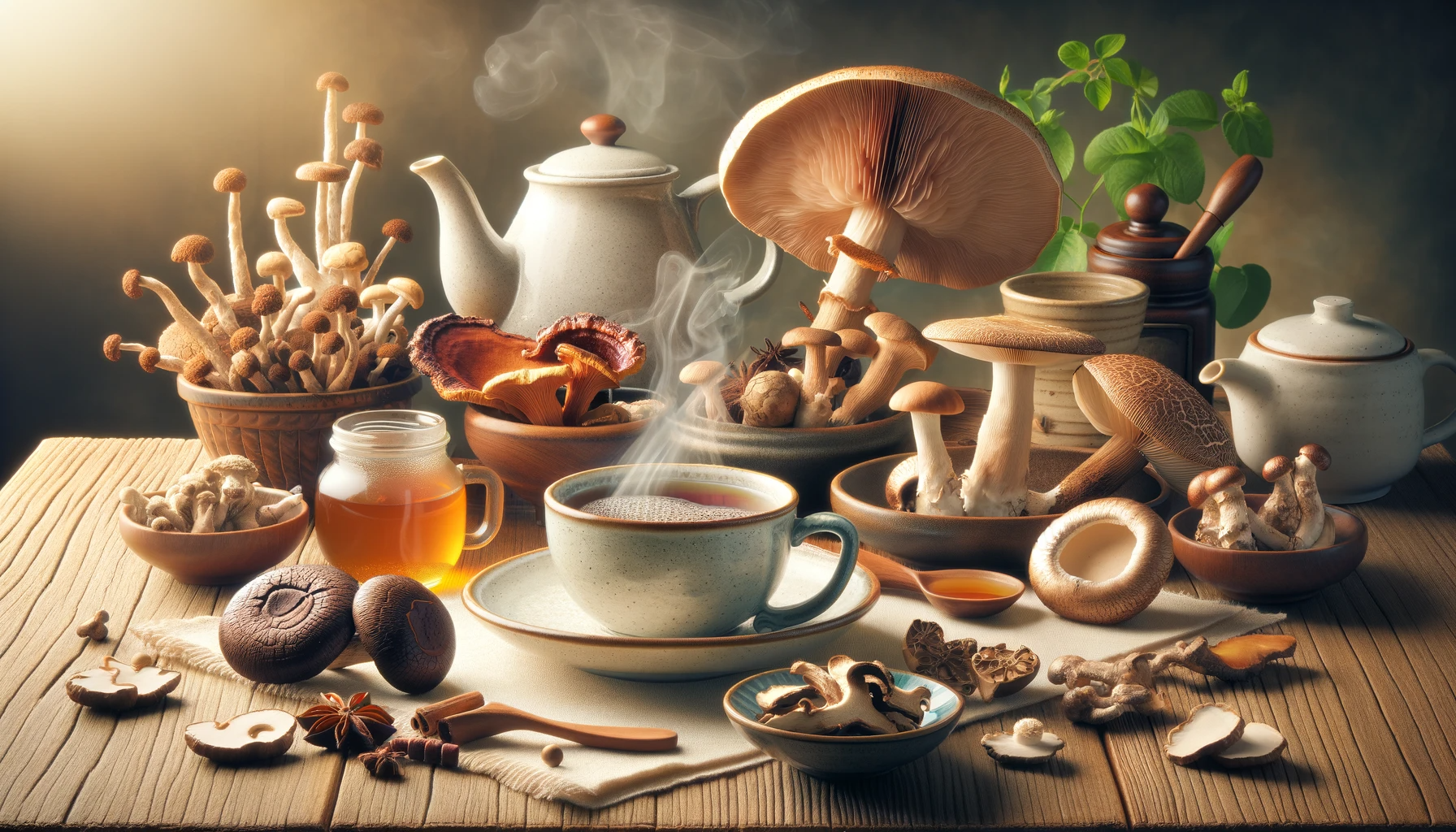Mushroom tea, a traditional beverage enjoyed in various cultures around the world, has gained popularity for its unique flavors and potential health benefits. This ancient elixir, often made from medicinal mushrooms, is revered not only for its earthy taste but also for its wellness properties. In this article, we’ll explore the intricacies of making mushroom tea, including the types of mushrooms used, brewing methods, and tips for enhancing its flavor.
Understanding Mushroom Tea
Mushroom tea is made by infusing dried mushrooms in hot water. The most commonly used mushrooms for this tea are medicinal varieties like Reishi, Chaga, Lion’s Mane, and Shiitake. Each mushroom offers a different flavor profile and health benefits, ranging from immune support to cognitive enhancement.
Health Benefits of Mushroom Tea
1. Reishi (Ganoderma lucidum)
- Immune System Support: Reishi mushrooms are known for their immune-modulating properties. They can help boost the immune system and are also used in some cultures for their antiviral and antibacterial properties.
- Stress and Sleep: Reishi can have a calming effect on the body, often used to reduce stress and anxiety, and improve sleep quality.
- Heart Health: Some studies suggest that Reishi mushrooms can help lower blood pressure and cholesterol levels, contributing to overall heart health.
- Anti-inflammatory Properties: Reishi contains compounds that may reduce inflammation, beneficial for conditions like arthritis and asthma.
2. Chaga (Inonotus obliquus)
- Antioxidant Powerhouse: Chaga is rich in antioxidants, which help in combating oxidative stress and may reduce the risk of chronic diseases.
- Digestive Health: It’s believed to support the health of the gastrointestinal system and may help in reducing inflammation in the digestive tract.
- Anti-Cancer Potential: Some research suggests that Chaga may slow the growth of certain cancer cells, though more research is needed in this area.
- Liver Protection: Chaga might help in protecting the liver by reducing inflammation and eliminating toxins.
3. Lion’s Mane (Hericium erinaceus)
- Cognitive Function: Lion’s Mane is famous for its potential neuroprotective properties. It may stimulate the growth of brain cells and improve the functioning of the hippocampus, a region of the brain involved in memory and emotional responses.
- Mental Health Benefits: Some studies indicate that it may help alleviate symptoms of anxiety and depression.
- Nerve Repair: It has the potential to stimulate nerve growth factor (NGF), which could aid in nerve repair and regeneration.
- Gut Health: There’s emerging evidence suggesting Lion’s Mane may help protect against ulcers in the digestive tract.
4. Shiitake (Lentinula edodes)
- Cholesterol Management: Shiitake mushrooms contain compounds that can help lower cholesterol levels and improve heart health.
- Skin Health: Rich in antioxidants, they may contribute to healthier skin by reducing inflammation and oxidative stress.
- Boosting Immunity: Shiitake mushrooms are known to enhance the immune system, helping the body to fight off pathogens more effectively.
- Anti-Cancer Properties: Like Chaga, Shiitake has been studied for its potential anti-cancer benefits, particularly in boosting the efficacy of the immune response against cancer cells. or more information on these findings, read the full study here.
Selecting and Preparing Mushrooms
When making mushroom tea, it’s crucial to select high-quality, dried medicinal mushrooms. You can find these at health food stores, Asian markets, or online.
Preparation
- Cleaning: Gently wipe the dried mushrooms with a soft brush or cloth to remove any debris.
- Slicing: If the mushrooms are large, slice them into smaller pieces to increase the surface area for better infusion.
Brewing Mushroom Tea
Ingredients
- Dried medicinal mushrooms of your choice
- Water
- Optional: Honey, lemon, ginger, or herbs for flavor
Method
- Boil Water: Bring water to a boil in a pot or kettle.
- Add Mushrooms: Add the dried mushrooms to the boiling water. Use about 1 teaspoon of dried mushrooms for each cup of water.
- Simmer: Reduce the heat and let the mushrooms simmer for about 15-30 minutes. The longer you simmer, the stronger the flavor and extraction of nutrients.
- Strain: Remove the pot from heat. Strain the tea into a cup, removing the mushroom pieces.
- Flavoring: Add honey, lemon, ginger, or herbs if desired. These can complement the earthy taste of the mushroom tea.
Tips for Enhancing Mushroom Tea
- Blending Varieties: Experiment by blending different types of mushrooms to create a unique flavor profile and combine health benefits.
- Cold Brewing: For a milder flavor, you can cold brew the mushrooms by soaking them in cold water for several hours or overnight.
- Herbal Infusions: Adding herbs like mint, chamomile, or lavender can introduce new flavors and additional health benefits.
- Sweeteners: Natural sweeteners like honey or maple syrup can soften the earthy taste of the mushrooms.
Conclusion
Mushroom tea is more than just a beverage; it’s a fusion of ancient wisdom and modern wellness. Its unique taste and potential health benefits make it a worthy addition to your daily routine. Whether you’re seeking relaxation, a cognitive boost, or immune support, mushroom tea can be a natural and soothing choice. Experiment with different mushrooms and flavorings to find your perfect brew and enjoy the earthy essence of this timeless elixir.
FAQs
Q: Can I reuse the mushroom pieces?
- A: Yes, you can usually reuse the mushroom pieces 2-3 times, as they continue to release flavor and nutrients.
Q: How long can I store mushroom tea?
- A: Mushroom tea can be stored in the refrigerator for up to 5 days.
Q: Is mushroom tea safe for everyone?
- A: While generally safe, it’s recommended to consult with a healthcare provider, especially if you have health conditions or are taking medication.
Q: Can I make mushroom tea with fresh mushrooms?
- A: Yes, but the flavor may be less intense. Drying concentrates the mushrooms’ flavors and medicinal properties.

Alex is a seasoned writer and researcher, specializing in psychedelic studies and mental health. Known for insightful and authoritative content, he combines extensive knowledge with a passion for exploring wellness and alternative therapies. Alex’s work is a trusted resource for readers delving into the world of mental well-being.


Leave a Reply